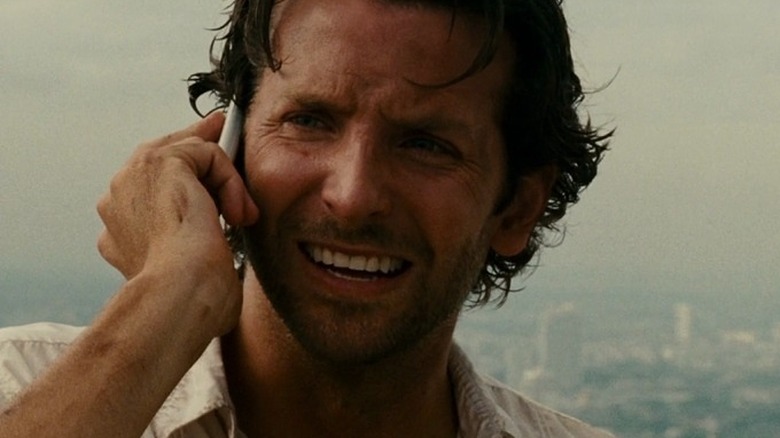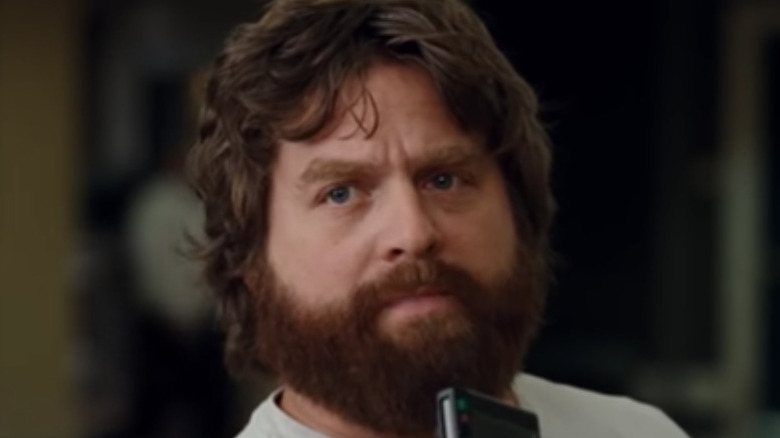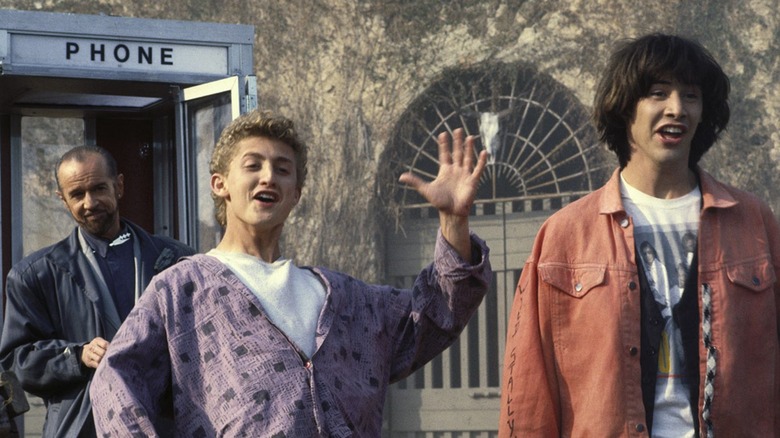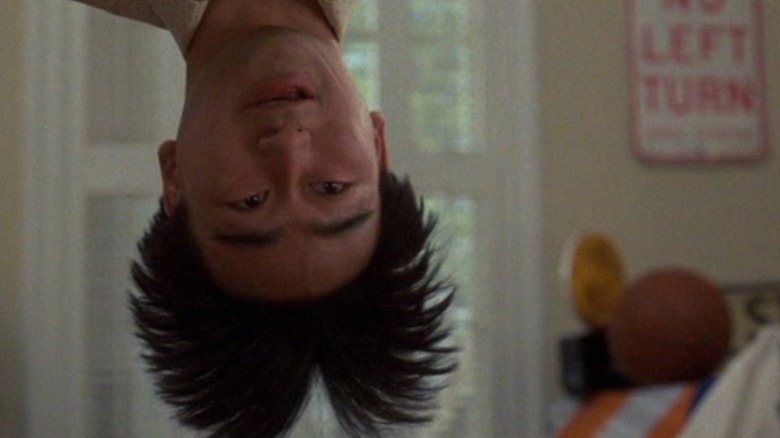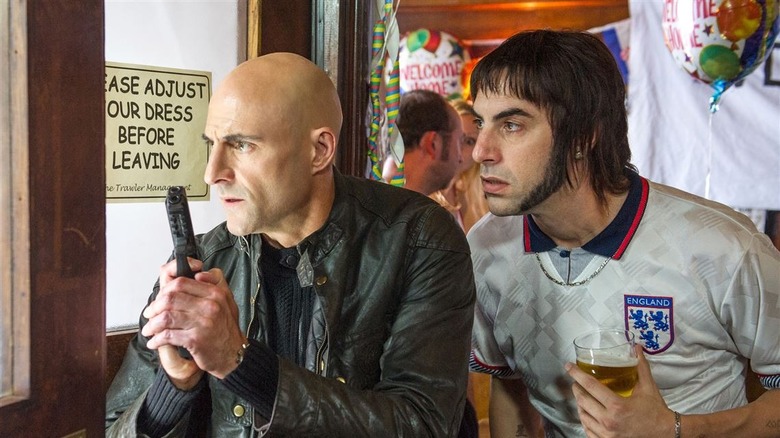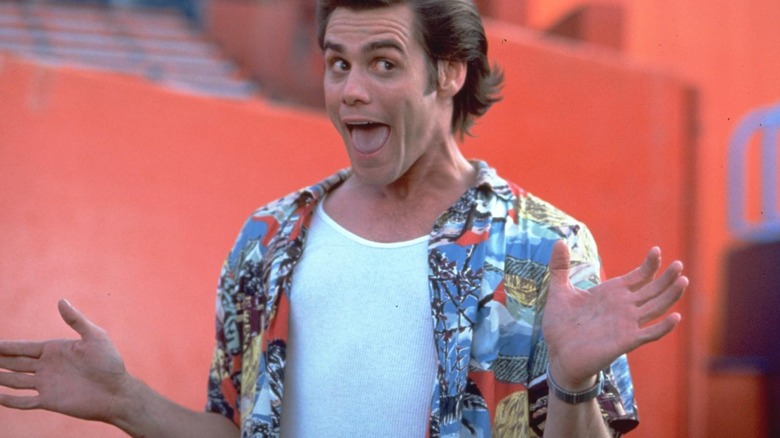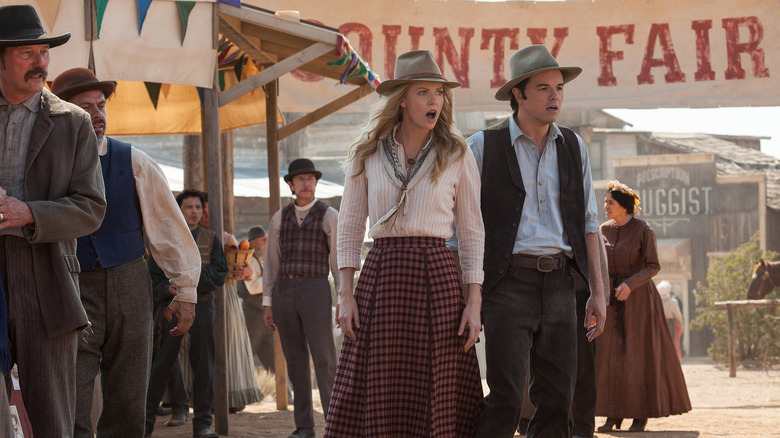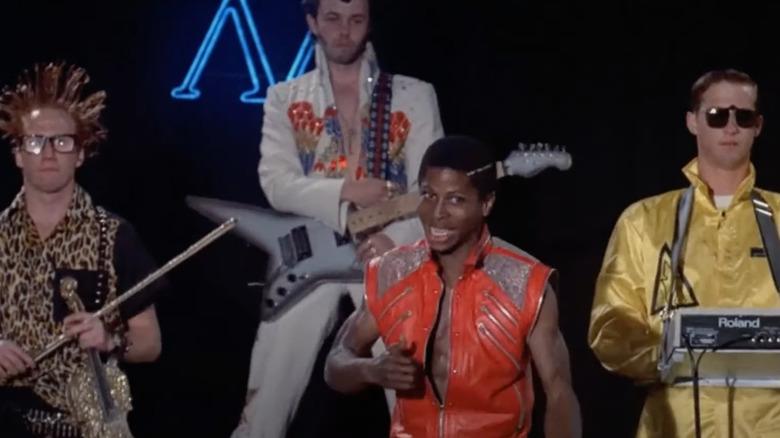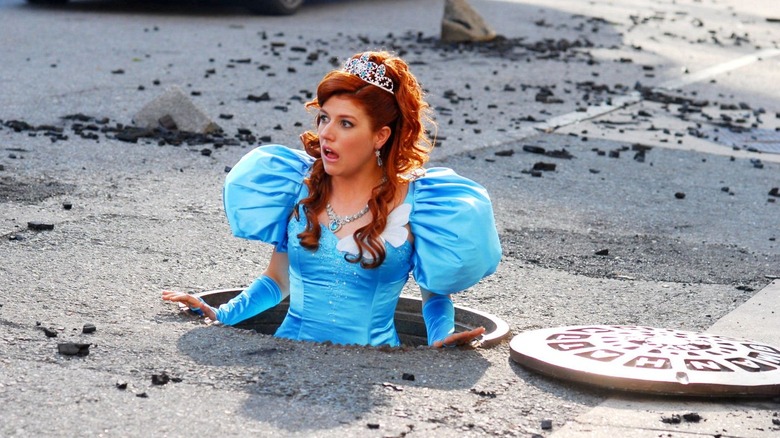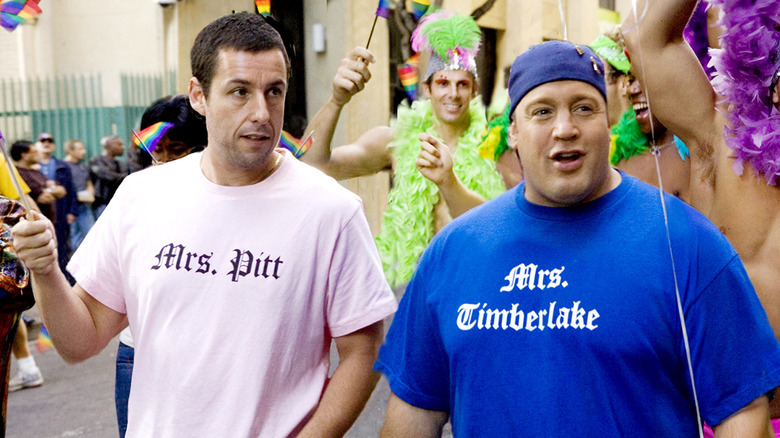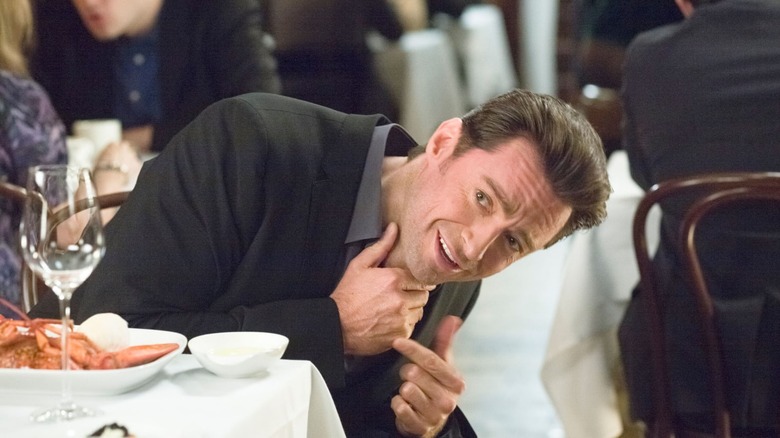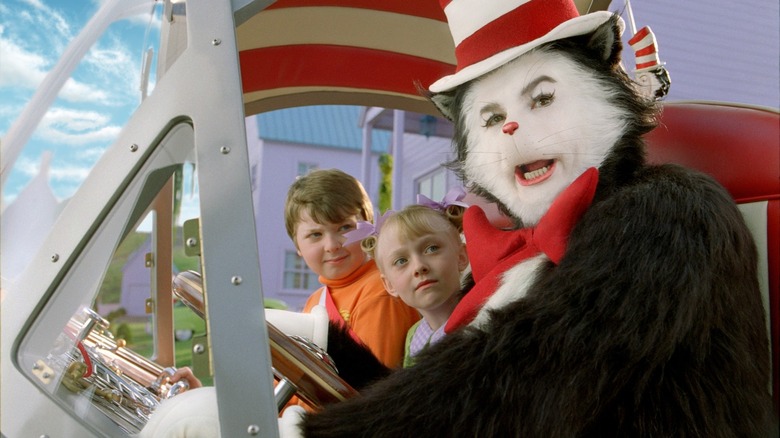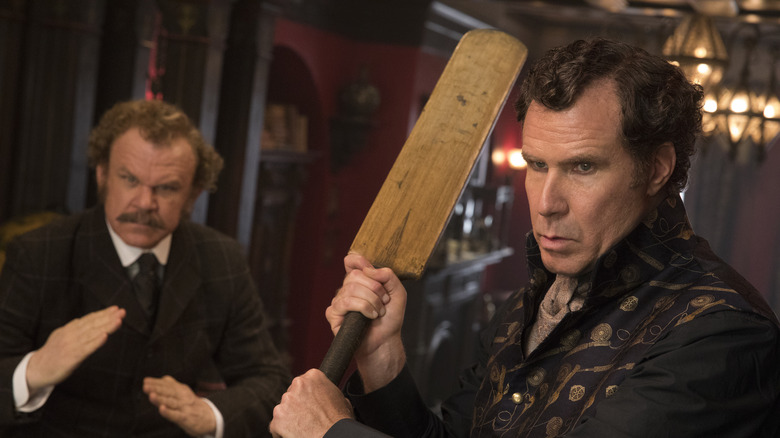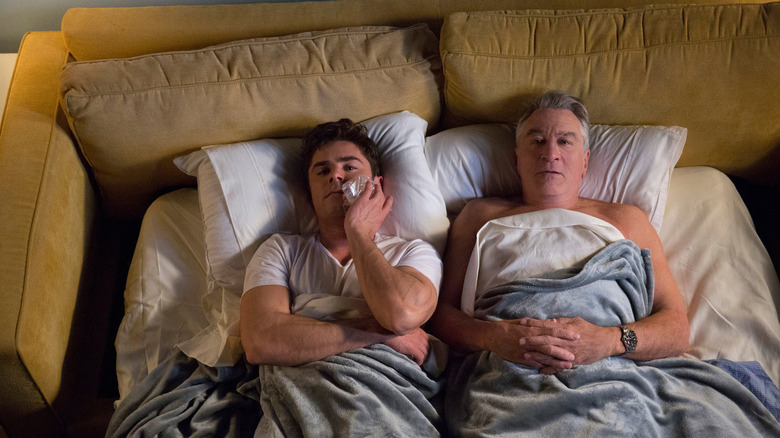The Most Cringeworthy Moments In Comedy Movies
Comedies are supposed to evoke waves of laughter. Plenty of movies over the decades, from "Bringing Up Baby" to "This Is the End," have successfully achieved this goal, winning over audiences all over the planet. But then there are the comedies that not only fail to elicit so much as a giggle, but actually make viewers cringe in all the worst ways.
Sometimes, comedy can use audience discomfort to great effect, such as when characters are hilariously awkward or when the script attempts to tackle a thorny topic. The genre can even provide thoughtful social commentary in the right circumstances. Other times, though, comedies miss the mark. This usually happens when the writers pick the low-hanging fruit, aiming for obvious, lazy, or derivative jokes. At their worst, these moments are downright offensive, coming at the expense of certain marginalized groups (the amount of both flagrant and subtler, "ironic" racism, transphobia, and homophobia discussed in this post is pretty alarming). Bad comedy can also arise from jokes that don't match the surrounding tone of the movie, feeling wildly out of place.
From lighthearted, carefree romps to incisive satires, the best comedies entertain audiences. Unfortunately, there are also a shockingly large amount of comedies that fail to fulfill the promise of this genre by delivering more cringeworthy moments. Here's a list of the worst offenders.
The Hangover: Part II
Mainstream comedy has used the transgender community as a punching bag for years. This phenomenon extends to major films like "The Hangover: Part II," which featured an extended sequence where principal character Stu (Ed Helms) discovers that the stripper he slept with the night before is actually trans. This prompts the camera to linger on the genitalia of the woman, along with the genitals of other nearby trans women also working at the strip club. Trans women are depicted as horrific to mirror the horror of Stu and his pals, a route that proves more dehumanizing than humorous.
This entire sequence is a troubling pop-culture depiction of trans women, harmfully reducing this community to just their bodies. Transphobia is real, and it makes a certain amount of sense that the ridiculous, immature characters would be transphobic, but "The Hangover: Part II" seems to expect audiences to be as repulsed by the mere presence of trans women as the film's main characters. Granted, nobody would expect the director of "Mr. Woodcock" and "War Dogs" to be the master of thoughtful or subversive depictions of trans people. But that doesn't excuse "The Hangover: Part II's" cringeworthy approach. This isn't fun shock-value humor; it's just a tired, upsetting gag that once again depicts trans people as an "other" to be mocked.
Bill & Ted's Excellent Adventure
For the most part, the first two "Bill & Ted" movies have aged like fine, or should I say bodacious, wine. However, one cringeworthy moment from the original film, "Bill & Ted's Excellent Adventure," involves the titular leads speaking a homophobic slur in unison after they hug each other (the slur returned in the film's sequel). It's a puzzling moment for a multitude of reasons, including how it doesn't gel with the easygoing personalities of Bill and Ted. These guys are open to partying with anyone from any time in history, gay people included.
Most cringeworthy comedy movie moments don't inspire retrospective responses of any kind from the film's cast members. However, in a welcome change of pace, "Bill & Ted" stars Keanu Reeves and Alex Winter have regularly expressed disapproval over the usage of this slur. Additionally, the duo has also endorsed the idea of providing a content warning for homophobic language before future screenings of the features. Though this instance of homophobia is most certainly not as excellent as the first two "Bill & Ted" installments, at least the franchise's leading men have been graceful in responding to those shortcomings.
Sixteen Candles
What else can be said about the character Long Duk Dong from "Sixteen Candles" at this point? Gedde Watanabe's role from this John Hughes teen comedy embodies countless stereotypes associated with Asian-American characters in cinema, from his thick accent and poor grasp of the English language to his effeminacy. Any appearance from the character is bound to inspire shudders from viewers rather than the chuckles one would expect from a lighthearted romp.
The racist depiction of Long Duk Dong has cast a long shadow. As recently as 2015, Kat Chow penned an essay for NPR breaking down the way Don embodied stereotypes Asian-American characters in films have been fighting against. Even Watanabe himself has admitted that he has more complex feelings about the role decades later. Needless to say, it's rare to find more discomforting teen comedy moments than the ones in "Sixteen Candles" built on mocking this character.
The Brothers Grimsby
In the middle of "The Brothers Grimsby," mismatched siblings Kyle Alan "Nobby" Butcher (Sacha Baron Cohen) and secret agent Sebastian Graves (Mark Strong) are forced to evade the attention of evildoers through a most disgusting means. Without a moment to spare, the duo hop inside the rectum of a nearby elephant. Just when it seems like the coast is clear, though, the two brothers realize they've hidden inside a female elephant. This revelation arrives as a fully erect male elephant comes charging around the corner and begins to engage in sexual intercourse with the elephant Butcher and Graves have hidden inside.
So begins an extended sequence where one elephant after another comes over to have sex with this particular pachyderm, traumatizing the brothers and dousing them in sticky liquids. Conceptually, this scene is exactly the kind of gross-out humor Cohen's comedies are always based on. However, as executed here, this is one cringeworthy gag that misses the mark due to its predictability. The moment the two characters hop inside an elephant's posterior, it's clear it will escalate. Repeating the inevitable climax (no pun intended) to that joke doesn't automatically make it funny or memorably repulsive. It just shows that even the man behind two very funny "Borat" movies can end up missing the mark sometimes.
Ace Venture: Pet Detective
If you think about "Ace Ventura: Pet Detective" in the modern pop culture landscape, you're likely seconds away from doing a stylized impersonation of famous Jim Carrey lines like "Allllrighty then!" or "Do not go in there!" However, what's less likely to be repeated is the film's finale, which features a reveal, courtesy of Ventura himself, that the film's villain, Lois Einhorn, was actually assigned male at birth. Earlier, this initial discovery caused Ventura to profusely vomit, and once he divulges this information to the rest of the film's cast, they also yak.
This cringeworthy sequence seems to go on forever with its wall-to-wall transphobia. Nothing is going on in this sequence in terms of comedy whatsoever. The cruelty of this scene has become infamous and is often cited as an example of mainstream Hollywood's transphobia. It was discussed in the 2020 documentary "Disclosure," and a 2016 New York Times piece used it as an example of how deeply entrenched transphobic norms were (and are) in Hollywood. If you're thinking of giving this Jim Carrey vehicle a watch, it's best to have the remote control ready so you can skip right on past this unspeakably uncomfortable instance of bigotry masquerading as comedy.
A Million Ways to Die in the West
Seth MacFarlane is known for always breaking taboos with his comedy. However, across his works, there's a tendency to target those gags at already marginalized voices. These jokes are less transgressive and boundary-pushing than they are stale and dumb.
A classic example of this phenomenon comes midway through MacFarlane's 2014 movie "A Million Ways to Die in the West." As MacFarlane and Charlize Theron's characters waltz around an old carnival, one booth game they linger on is titled Runaway Slave. The booth is adorned in racist drawings of Black people, which causes MacFarlane's character to express his dissatisfaction with the game.
At first glance, this might not seem so bad — it's just pointing out how common racism was in the Old West, right? — but the gag fails to work properly on several levels. Chiefly, the total lack of people of color in the cast of "A Million Ways to Die in the West" makes this throwaway reference to racism feel hollow. The movie appeared to recognize that this gag missed the mark since a credits scene awkwardly cuts back to this booth and depicts Jamie Foxx's Django from "Django Unchained" showing up to murder the operator of this game. It's a clumsy capper that doesn't quite solve the problem.
Revenge of the Nerds
Towards the end of "Revenge of the Nerds," protagonist Lewis (Robert Carradine) finally has sex with his crush, Betty (Julia Montgomery), by putting a Darth Vader mask on his head and posing as Betty's boyfriend. It's an obvious example of rape, but in the film, it's depicted as a cutesy win for the "nerdy" Lewis, while Betty is nonplussed when she finds out who she's sleeping with. The film proceeds from here without comment on the consequences of this despicable behavior. A moment meant to evoke cheers and laughs from the viewer is instead a disturbing example of how normalized rape culture is in mainstream cinema. Even goofy comedies like this one feature explicit portrayals of rape passed off as wish-fulfillment fantasies for cis-het male viewers.
Unsurprisingly, plenty of critical pieces have been written over the years regarding the problems with this sequence. In an oral history of "Revenge of the Nerds" for GQ, the cast and crew members of the production even reflected on how the scene showcased the era's misconceptions of what constituted rape and how out of touch the sequence was with reality. Even the artists behind this 1980s comedy can recognize just how cringeworthy this sex scene from "Revenge of the Nerds" is.
Disaster Movie
In its ceaseless skewering of any movie that received a wide theatrical release in 2007 and 2008, "Disaster Movie" eventually sets its sights on "Enchanted." This parody features its own version of Princess Giselle (here played by Nicole Parker) emerging from a manhole, just like in the original Disney title. Seconds after standing up, though, the mock Giselle is hit by a taxi, causing her to fly across the street. From there, the rest of "Disaster Movie" keeps heaping on all kinds of physical torment onto Giselle before concluding her storyline with a transphobic gag and her death.
That initial visual of Giselle getting hit by a taxi is but a small foretaste of what's to come. "Disaster Movie" seems to believe violence against women is inherently hysterical and that the most shallow of pop culture references are equally amusing. There's no real insight or depth in "Disaster Movie's" lampooning of "Enchanted," it's just another pop culture property checked off a list. Plus, juxtaposing a traditional Disney princess with brutality is obvious and unoriginal. This cringeworthy sequence was meant to elicit gasps and belly-laughs, but instead, it just reflects the creative bankruptcy of the film it inhabits.
I Now Pronounce You Chuck and Larry
Much of the controversy surrounding "I Now Pronounce You Chuck and Larry" in its initial theatrical release concerned how the film's premise, about two straight men posing as a married couple, would just be an excuse for a barrage of gay panic jokes. What proved even more upsetting than the homophobia in this Adam Sandler vehicle was a bizarre instance of yellowface. Officiating the ceremony between the film's protagonists is a Canadian-Japanese preacher named Morris Takeshi, played by Rob Schneider in thick yellowface and speaking in an equally abrasive accent.
Now, it is true that Schneider is of Filipino descent by way of his mother and her family. However, his ancestry doesn't give him a pass to portray a character of Japanese descent in yellowface. Takeshi is an awful caricature in the vein of Mr. Yunioshi. It's hard to believe it made it into a theatrical release in 2007. Aside from being offensive, it's also senseless and out of place — though we guess it makes sense that a film so clueless on queer issues would also be so thoughtless about depicting people of color.
Movie 43
The anthology film "Movie 43" kicks off with a segment centered on Kate Winslet and Hugh Jackman playing characters going on a blind date. Moments into this date, Jackman's character takes off his scarf and reveals that he has a pair of testicles dangling from his chin. This kicks off a series of gags involving Jackman being oblivious to the growth on his chin, even when those genitals are inadvertently dunked in a bowl of soup.
The initial sight of those testicles hanging from Jackman's face is cringeworthy, but not for the reasons the filmmakers intended. Rather than being fun a gross-out gag, "Movie 43" makes it apparent from the start that it has no imagination. The sight gag here begins and ends with the concept of a man as conventionally handsome as Hugh Jackman having genitals where they don't belong. The rest of the sketch stretches its concept well past its breaking point. Other comedies, like "Forgetting Sarah Marshall," have used nudity in ways both humorous and unconventional. This inaugural segment in "Movie 43"? Not so much.
The Cat in the Hat
It's reasonable to expect an adaptation of a Dr. Seuss book to eschew raunchy, adult humor, as with any film aimed at kids. For some reason, though, the 2003 "Cat in the Hat" movie, among its litany of inexplicable creative decisions, refused to adhere to this simple request. The runtime of this Mike Myers vehicle is peppered with jokes that don't match the child-friendly vibes of its source material.
The worst such gag comes when the titular Cat picks up a garden hoe to "kill" a pesky dog. When the instrument functions too well as a threatening tool and scares away the dog, Cat, in a moment of frustration, calls his weapon a "dirty ho" before apologizing for his sharp tongue and leaning in to give it a smooch. It's an uncomfortably bizarre tangent and not even a funny one. Its only saving grace is that it probably went over the heads of child viewers, so parents were spared having to explain the joke. We don't think this is what Dr. Seuss had in mind when he first wrote the "Cat in the Hat" book.
Holmes & Watson
"Holmes & Watson" establishes right from the get-go that this won't be a witty comedy. Once Will Ferrell's take on Sherlock Holmes waltzes onto the screen wearing a "Make England Great Again" hat, a reference to Donald Trump's run for U.S. President. Though intended to be shorthand for establishing that this version of Holmes is a buffoon, it's mostly just an eye-roll–worthy moment of toothless, nonsensical political satire.
The cringiest thing about this gag is how parodies of that hat had already been done to death in pop culture by then. "The First Purge" made it the centerpiece of its teaser poster a whole year before "Holmes & Watson" hit theaters. Also preceding "Holmes & Watson" was "Pitch Perfect 3," which featured the character Fat Amy, who also lampooned this famous cap. There had to have been more creative ways to poke fun at this administration, or smarter ways to use the concept of an idiotic Holmes. Unfortunately, "Holmes & Watson," throughout its entire runtime, constantly delivers gags this bereft in imagination.
Dirty Grandpa
The critically reviled "Dirty Grandpa" is full of repulsive gags that mock women and the elderly. Did anyone think the gays would get out of this project unscathed? Throughout "Dirty Grandpa," Lieutenant Colonel Richard "Dick" Kelly (Robert De Niro) keeps referring to openly gay supporting character Bradley (Jeffrey Bowyer-Chapman) with homophonic nicknames. Though Bradley keeps calling out this behavior as inappropriate, "Dirty Grandpa" clearly wants its audience to think of Kelly's recurring outbursts of bigotry as amusing, not concerning.
Provocative comedy only works when it's actually doing something fresh or new. Think of "Blazing Saddles" subverting the norms of the Western genre by utilizing a Black protagonist to highlight racist hallmarks of this storytelling format. "Dirty Grandpa," meanwhile, just rehashes familiar homophobic terms most R-rated comedies made before 2018 indulged in. The familiarity of these cringeworthy instances of "ironic" bigotry in "Dirty Grandpa" proved so overwhelming that they inspired a Slate article. This piece called out "Dirty Grandpa" and other major comedies for utilizing tired homophobic humor under the guise of acknowledging its awfulness. It's hard to be subversive and wickedly funny when you're indulging in such overdone and disrespectful homophobic remarks.
